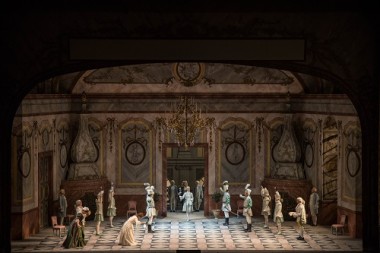 United States Verdi, Der Rosenkavalier: Soloists, Lyric Opera of Chicago, Edward Gardner (conductor), Civic Opera House, Chicago. 13.02.2016. (JLZ)
United States Verdi, Der Rosenkavalier: Soloists, Lyric Opera of Chicago, Edward Gardner (conductor), Civic Opera House, Chicago. 13.02.2016. (JLZ)

(c) Andrew Cioffi
Verdi, Der Rosenkavalier
Cast:
Octavian: Sophie Koch (Alice Coote 4–13 March)
Marschallin: Amanda Majeski
Sophie: Christina Landshamer
Baron Ochs: Matthew Rose
Faninal: Martin Gantner
A Singer: René Barbera
Annina: Megan Marino
Valzacchi: Rodell Rosel
Production:
Director: Martina Weber
Designer: Thierry Bosquet
Lighting Designer: Duane Schuler
Chorus Master: Michael Black
Conductor: Edward Gardner
Familiar to Chicago audiences for decades, Richard Strauss’s Der Rosenkavalier returned in a traditional production from San Francisco Opera. The conventional staging gave ample space for a comedy that must have heart, and a love story that must not take itself too seriously. The result, directed by Martina Weber, was an enjoyable evening, notwithstanding some of the shortcomings that are inevitable in a work of this complexity.
The orchestra was well-rehearsed, with the waltz-sequences always prominent. Some touches, like the intimate, chamber music-like sonorities at the presentation of the silver rose, were audible, but not resonant. In this rich score, complex quiet passages are sometimes as exciting as the forte ones, and the accomplished conductor Edward Gardner will no doubt address this issue as the run progresses.
Of the principals, Amanda Majeski has a beautiful voice, but her work as the Marschallin was sometimes eclipsed by the orchestra or other voices in ensemble passages. Perhaps the blocking had something to do with this, since Majeski was often turned to the side or the back of the stage, so that it became difficult to hear her. The monologue at the end of the first act had a good sense of delivery, with her phrasing and pacing nicely suggesting the Marschallin’s thoughts. Majeski sang the final trio with finesse, melding both music and drama seamlessly.
Similarly, Sophie Koch’s supple voice for Octavian was sometimes overbalanced by the orchestra. Her diction was only clear in the overtly pronounced satirical passages when Octavian masquerades as Mariandel. At the end of the third act trio, Koch deferred to the Marschallin, with a shaded voice that opened up only when Octavian was alone with Sophie, limiting the redolent expression of the three principals in the familiar trio, as well as in the extended duet that concludes the act.
As Sophie, Christina Landshamer gave her character a Straussian sound and style, with reliable pitch and rhythm. Her sometimes light sound was never once absorbed into the accompaniment. Landshamer made the convent girl depicted in the libretto come to life. In the second-act duet, her appealing voice blended well with Koch’s, and foreshadowed the sonorous duet with which the opera concludes.
The other members of the cast were able and sometimes appealing. If the roles of Annina and Valzacchi were perhaps too overt, at least Rodell Roselle and Megan Marino always delivered their lines clearly. As the Italian singer, René Barbera seemed overly loud (though this was not a problem on the opening night broadcast). As Baron Ochs, Matthew Rose made an effort to bring out the role’s lyrical qualities, without resorting to the declamatory approach used by some singers. Yet he was often difficult to hear in the heavily scored passages—the very places where the text is crucial to the drama. Rose is a younger Ochs—like much of the cast, closer in actual age to the characters in the libretto. His Ochs is of the same generation of the Marschallin, even if he is worlds apart from her in his demeanor.
Throughout this production, the orchestra was quite prominent. The designation of “tone poems with voices” often applied to Richard Strauss’s Salome and Elektra might well characterize some aspects of Gardner’s interpretation of Der Rosenkavalier. As popular as the opera’s suite is in the concert hall, the music sometimes has a different function on stage, where it needs to blend more with voices than occurred here. Gardner’s active role in the production suggests a conductor who can shape performances with facility.
The sets merit attention, too: a throwback to productions that used painted flats in lieu of three-dimensional props. But given that the inspiration for this production was Alfred Roller, his designs for the work’s premiere, and his penchant for authenticity, some details were unsatisfying. The dressing-room table, for example, where the Marschallin sat for her hairdressers could have been a bit more lavish. (After all, Roller revolutionized modern staging in the early twentieth century when he created three-dimensional sets for Tristan und Isolde and Fidelio.) Nevertheless, Der Rosenkavalier should draw large crowds during its lengthy run.
James L. Zychowicz
